Newsletter


Our Newsletter
Connections
Sep
3

Are You Awake?
Here at the Jewish Home, we have been hearing the shofar (ram's horn) blown almost every day, at lunch time or breakfast, in each of our 17 dining halls at Grancell Village, since the Jewish month of Elul began. The goal is to hear it every day except Shabbat for the month preceding Rosh Hashanah, the holiday that marks the New Jewish Year.
Many people have stopped me to ask, "Is that a real horn of an animal?" It certainly is. In fact, appropriately, a shofar usually comes from an elderly ram. The older the animal, the longer the horn. Seniors are revered by our tradition even among shofar-producing animals!
The shofar has many levels of meaning. First of all, it is one of the oldest, if not the very oldest, instrument in recorded history. We know that the shofar is at least 3500 years old, because the Torah is that old and refers to the shofar repeatedly.
There is something so primal, so natural and so ancient about the sound of the shofar. It connects us to our past, as we know that the shofar was used as a tool for calling the community together. Long before television and computers, telephones, radios and smartphones was the simple horn of a male goat that announced it was time to gather.
The shofar has also served for over 3500 years as the horn that announces the Jewish New Year. Ironically, in our secular American culture, people often toot horns at midnight after counting down the last seconds of December 31st. "Happy New Year!" we often shout, as we blow plastic and paper horns that announce a new year has come.
But the most profound meaning of the shofar was articulated by Maimonides, a medieval Rabbi who was incredibly brilliant and learned. He suggested that the shofar is like a spiritual alarm clock, saying, "Awake you sleepers from your sleep. Arouse you slumberers from your slumber and ponder your deeds; remember your Creator and return toward G-d in repentance… Look well to your souls and consider your deeds; turn away from wrong ways" (Hilkhot Teshuvah 3:4).
Like Maimonides, I believe we can spiritually "fall asleep." With all the pressures of life, with all of our struggles, concerns and worries, with our deficit sometimes of actual sleep, we sometimes start to simply try to make it through the day or week. We sometimes forget we are here for a greater purpose. We sometimes forget we are here to be good and kind and to help others. Sometimes we forget to wake up our souls and do the hard work of becoming our best selves.
The shofar is a great reminder to wake up and constantly try to improve and grow.
Happy New Year! A sweet and joyful and healthy year to come!Rabbi Karen BenderSkirball Director of Spiritual [email protected]
Sep
3
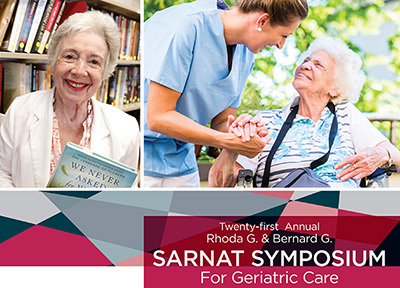
The 21st Annual Sarnat Symposium
On October 16th the Jewish Home will present the 21st annual Rhoda G. and Bernard G. Sarnat Symposium for Geriatric care. An endowment from the Sarnats (of blessed memory) helps the Home educate the public and senior-care professionals about the unique aspects of geriatric care, advancements in the field, and policy changes affecting its future.
This year Harry Nelson, founder and managing partner of Nelson Hardiman healthcare specialty law firm, will tell us what's ahead for Medicare and health policy for seniors. Dr. Murali Nair of USC's Roybal Institute of Aging will teach about mindfulness and its effects on longevity. Jennifer Schlesinger of Alzheimer's Los Angeles will focus on how diverse communities view dementia and how this impacts disease-identification, diagnosis, and care. Dr. Connie Corley and Marilyn McLaughlin will lead a hands-on workshop involving drumming and movement. They will explain how rhythm-based activities can enhance engagement, socialization, focus, and self-expression in seniors.
If you are interested in attending the Sarnat Symposium, you may download a brochure and register online at http://www.lajh.org/resources/sarnat-symposium. The price of $100 includes a continental breakfast, lunch, four presentation workshops, handouts, and six CEU credits. The Sarnat Symposium takes place at Valley Beth Shalom at 15739 Ventura Boulevard in Encino.
Aug
13
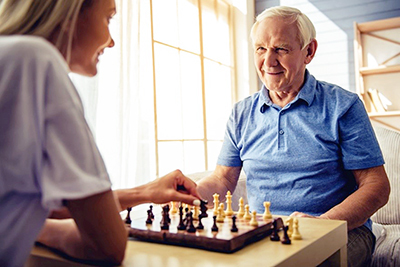
National Senior Citizens Day
August 21st is National Senior Citizens Day as declared by Ronald Reagan during his presidency. It’s a good reminder to set aside some time on that day to celebrate the seniors in your life. The day is also the perfect time to reflect on the ways we can help seniors thrive. Consider volunteering at a senior center or a residential care community. You may be surprised at how fulfilling and enjoyable it is to share your time and your heart with those who are older and wiser. You don’t need any special talents to be a volunteer, although entertainment is always appreciated. You can simply show up and ask to be put to use. You might find yourself showing movies, reading books aloud, driving people where they need to go, or even calling bingo. You will definitely find yourself having fun and enjoying the personalities of your new friends. To explore volunteering opportunities at the Jewish Home, contact Stacy Orbach at 818-757-4442 or [email protected]
Jul
30
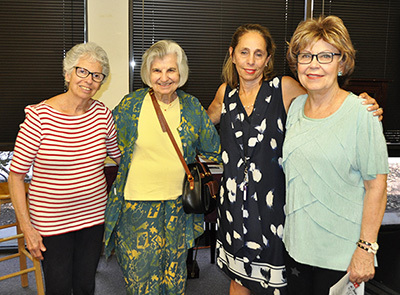
Avoiding Scams and Financial Fraud
Susan Strick, Deputy City Attorney and Director of Elder Abuse for Los Angeles, visited the Los Angeles Jewish Home to speak to residents about online scams and financial fraud. She provided detailed information to help seniors protect themselves. Here are some of her tips.
Do
Be careful about whom you designate as your power of attorney. Make sure it's someone you trust and have known a long time, if possible.Read your bank statements carefully. Check for suspicious transactions.Understand the documents you sign.When browsing online, clear your cookies and search histories periodically. Scammers can use this information to learn about your interests.Be suspicious of unsolicited phone calls. Many current scams include calls from the IRS or US Marshall's office demanding money, ransom calls about your grandchildren or other family members, calls about missed jury duty or traffic violations asking you to pay a fine, and/or calls offering to fix your computer by logging into your system remotely. Hang up on suspicious callers and delete suspicious emails.Shred important documents you no longer need.Report suspected scams or abuse to authorities and/or family members.Share stories of fraud attempts with friends. They are more likely to spot a scam if they know about it.
Don't
Give out your social security number unless it's absolutely necessary.Save your credit card number in your account when shopping online.Friend people on Facebook you don't actually know.Post vacation plans on Facebook. It makes your home vulnerable to break-ins.Fall for work-at-home schemes or investment opportunity frauds. These unsolicited offers are often fraudulent. So are sweepstakes and lottery wins for contests you never entered.Buy medical equipment you don't need, even if Medicare is paying for it. This might be Medicare fraud.
There are many resources available if you have been a victim of a fraud or suspect someone is trying to exploit you.
Consumer Fraud: California Dept. of Consumer Affairs, www.dca.ca.gov, 800-952-5210Internet Fraud: FBI Internet Crime Complaint Center, www.ic3.govInvestment Fraud: Financial Industry Regulatory Authority, www.finra.org/complaint, 800-289-9999Mail Fraud: United States Postal Inspector, 877-876-2455Telephone Fraud: Federal Trade Commission, www.identitytheft.gov, 877-382-4357Medicare/Medical Fraud: California Attorney General Bureau of Medi-Cal Fraud & Elder Abuse, www.ag.ca.gov/bmfea, 800-722-0432
Jul
24
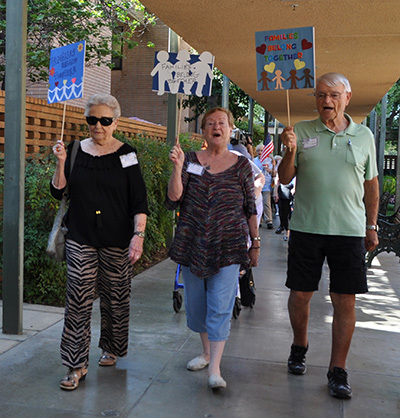
Los Angeles Jewish Health Residents March to Keep Families Together
Activists come in all ages. The seniors at the Los Angeles Jewish Home showed they, too, have a voice in our social system. They are more than willing to organize around a cause that touches their hearts in order to help others.
Resident Freddie Miller saw coverage of immigrant families being separated on the news and felt she had to do something. Her heart was breaking for them. "Children are my thing," she said. Her daughter, Jennifer Tidstrand, told us, "My mom is incredibly bright, politically astute, and she has a big heart for children."
Freddie suggested the idea of a march for awareness to the resident council of the Jewish Home. Council president Robert Lehman embraced the idea wholeheartedly. "We are a family at the Jewish Home. It was such collective support," he said.
Over 30 residents made signs, wore badges, and marched around the Eisenberg Village Campus. Skilled nursing residents joined them by waving flags and singing "God Bless America" along their marching route.
Ida Franklin joined the march, she said, "Because I care. I think it’s good to keep it alive until they get everything taken care of." Marilyn Weiner was happy to march, too. "I just hope we make a difference."
Jul
16
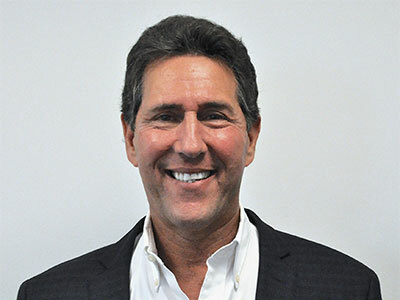
Andrew Berman New Board Chair of Los Angeles Jewish Home
Andrew Berman, an entertainment industry veteran with over 35 years of experience in global sales, marketing, and content acquisition, has assumed a two-year term as chair of the Board of Directors of the Los Angeles Jewish Home. His new role began on July 1, 2018.
A native Angeleno, Berman has a long history of philanthropic involvement in his local community. His work with the Jewish Home has particular resonance. "I believe it's an obligation to give back, and I've always had an affinity for seniors," Berman says. "I'm thrilled and honored to have this role."
Jewish Home CEO-President Molly Forrest points to Berman's record of success in business and his longstanding commitment to strengthening nonprofits as key assets to the Home's growth and development. "Andrew is a distinguished leader with a proven ability to get results," she says. "We are delighted he will be applying his knowledge and expertise on behalf of the thousands of seniors we serve."
Berman's focus at the Jewish Home is expanding programs and services to cover Los Angeles' growing senior population. This includes spreading the positive message about the Home to donors and other supporters throughout Southern California. "This is such an impressive and amazing organization, and so many people aren't fully aware of all the services and lines of care that we offer," he notes. "Whether they are accessing independent living, skilled nursing, or memory care, our seniors receive extraordinary care. A big part of the reason is the loyalty and dedication of the people who work here – many of them have been with the Home for 20 or 30 years. They are truly invested in what they do, and it shows."
Berman plans to leverage that investment, building on the Jewish Home's distinguished brand and legacy of impact. "The Jewish Home makes a significant difference and impact in seniors' lives every day," he says. "How many other organizations can say that?"
"The Jewish Home is fortunate to have extremely capable men and women serving on our board," says David Swartz, the Board of Director's outgoing chair. "Andrew Berman is a stellar example: His knowledge, dedication, and experience will undoubtedly take the Home to a new level of excellence."
In addition to his work with the Jewish Home, Berman has served in a volunteer capacity with organizations including the Crohn's and Colitis Foundation of America (past president, Board of Trustees), Didi Hirsch Mental Health Services (Capital Campaign Committee), and Stephen Wise Temple (Board of Directors), and Connecting to Cure (Board member.)
Berman grew up in Beverly Hills but has spent the past three decades living in the San Fernando Valley. He and his wife, Marci, have two adult daughters. He graduated from California State University, Northridge with a B.A. in radio, television, and film.
Jul
16
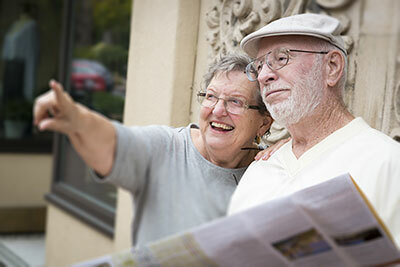
Senior Travel Tips
For people of all ages, but especially for seniors, travel helps improve mood and outlook on life. It strengthens relationships with loved ones far away. It allows you to commune with nature and increase your understanding of other people and cultures. Meeting new people, exploring new destinations, and engaging in activities outside of your normal routine stimulates the brain, leading to better cognition. Vacationing also reduces stress levels and helps you exercise more as you wander around new environments.
Vacationing can be a bit more challenging as you get older. There are ways to smooth the bumps in the road while expanding horizons and creating new memories. With a little planning, you can continue to enjoy all the benefits travel brings well into your golden years.
Planning
Cruise ships are built to be handicapped-accessible, have on-board clinics, and you only have to unpack once, no matter how many countries you visit.Bus tours do the navigating for you and allow you to enjoy sightseeing at a leisurely pace.When booking hotels and B&Bs, be sure to ask about stairs, elevator service, narrow hallways, and wheelchair-accessible bathrooms. Make sure the place you are staying is convenient for your needs.Always ask for senior discounts for train tickets, entrance fees, and event tickets. You might be surprised at how many places offer them.When needed, wheelchair and electric cart services at airports help you get through security lines more quickly and make tight flight connections. Request these services when booking tickets.Requesting a wheelchair at a theme park can give you a break from all the walking and usually gets your whole family to the front of the line for each ride.
Packing
Wheeled luggage, especially the upright kind with four wheels, makes bringing your clothes around the world a whole lot easier.If you pack very lightly and only bring carry-on luggage aboard airplanes, you can skip baggage claim altogether.
Health
Medicare is not valid outside the United States. Consider buying travel insurance that includes health coverage for overseas travel. It can bring peace of mind in case medical emergencies crop up while out of range of your usual medical coverage.Bring all the medications you will need with you in your carry-on bag. Getting prescriptions filled overseas can get tricky and time-consuming.Build in down time. Be sure one or two days of your itinerary is dedicated to rest and relaxation so you have the energy to enjoy your exciting new experiences.
Jul
2
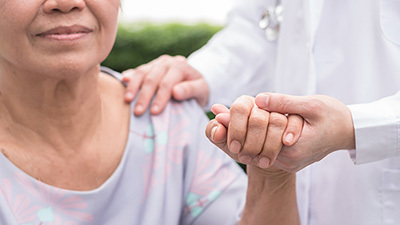
What Does Palliative Care Provide?
The goal of palliative medicine is to bring comfort to patients with serious or chronic life-limiting illnesses. The term “palliative” means to lessen or relieve without curing. Palliative medicine practitioners at the Jewish Home’s Center for Palliative Medicine help people manage their symptoms, understand their choices for medical care, and regain their strength to carry on with daily life and/or medical treatment. Palliative medicine doctors and social workers do this in part, by also addressing the emotional, social, and spiritual problems that illnesses can bring up.
Palliative Medicine is helpful to those experiencing many different conditions some of which are:
ALS (amyotrophic lateral sclerosisCancerCOPD (chronic obstructive pulmonary disease)CHF (congestive heart failure)Dementia (including Alzheimers)EmphysemaKidney disease
Palliative medicine is appropriate at any point in an illness. It may be used in conjunction with curative medicine and help you or a loved one manage the side-effects of medical treatments. The palliative medicine team will partner with the patient’s physicians and family members to provide an extra layer of support.
For more information, contact the Los Angeles Jewish Home’s Center for Palliative Medicine at 818.578.7427 or visit https://www.lajhealth.org/our-programs/skirball-palliative.
Jun
18
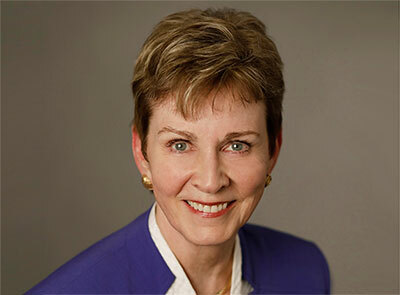
Molly Forrest Elected as Next Chair of LeadingAge CA
Molly Forrest, Chief Executive Officer-President of the Los Angeles Jewish Home, has been selected as chair-elect of LeadingAge California, the state's top advocacy group for nonprofit senior living and care. Her two-year term begins July 1, 2018.
Forrest is the first leader of a Jewish home to hold this position, helming an association representing nearly 600 members statewide who together serve more than 100,000 California seniors. LeadingAge's critical work assists the state's older adults with the full continuum of care including issues related to affordable housing, continuing care retirement communities, assisted living, home- and community-based care, and skilled nursing.
"For more than half a century, LeadingAge has demonstrated an unflagging commitment to raising awareness about seniors' needs and putting them front and center on the state and national policy agenda," Forrest says. "I look forward to carrying that tradition forward as we seek to make a difference for California's rapidly expanding senior population."
That expansion – an expected 87 percent increase in California's senior population by 2030 – is resulting in unprecedented growth in the market for services. In the next two years alone (through 2020), LeadingAge projects an 80 percent increase in the demand for aging-related healthcare. "This is a challenge facing all Californians of every age," Forrest says. "Our system for providing senior care is inefficient and fragmented, and everyone pays for that. LeadingAge is playing an instrumental role in helping us think through how we as a society can finance the care our seniors deserve."
Vision and experience were vital factors in Forrest's recent elevation. "Molly's leadership on the LeadingAge board and at the Los Angeles Jewish Home propelled her to this position," says Jeannee Parker Martin, LeadingAge's President and CEO. "We are thrilled by her election."
LeadingAge California has represented nonprofit senior living and service providers since 1961. Whether testifying at public hearings, building coalitions, visiting member communities, or engaging with elected officials, the organization actively works to create systemic change through advocacy that strengthens members' viability and supports innovations in the delivery of aging services.